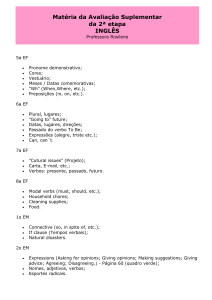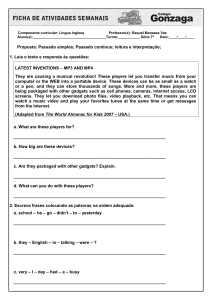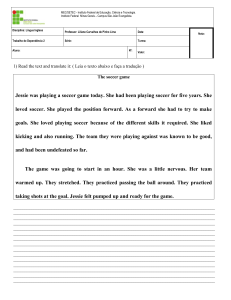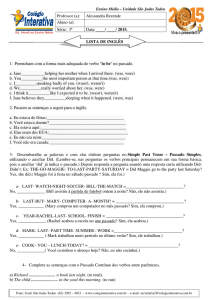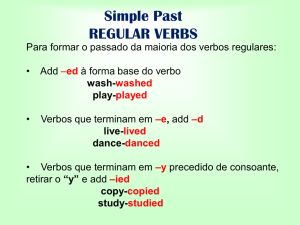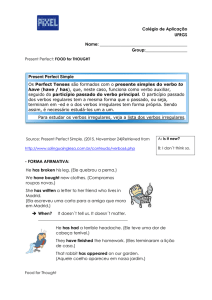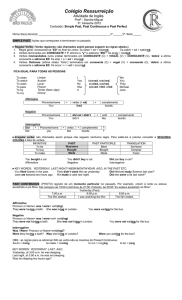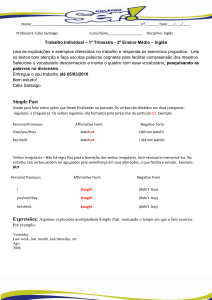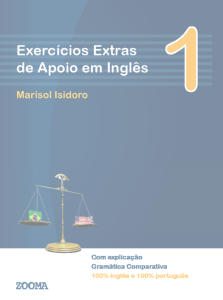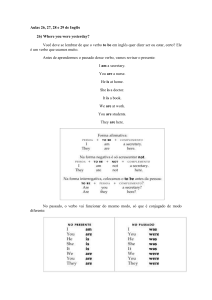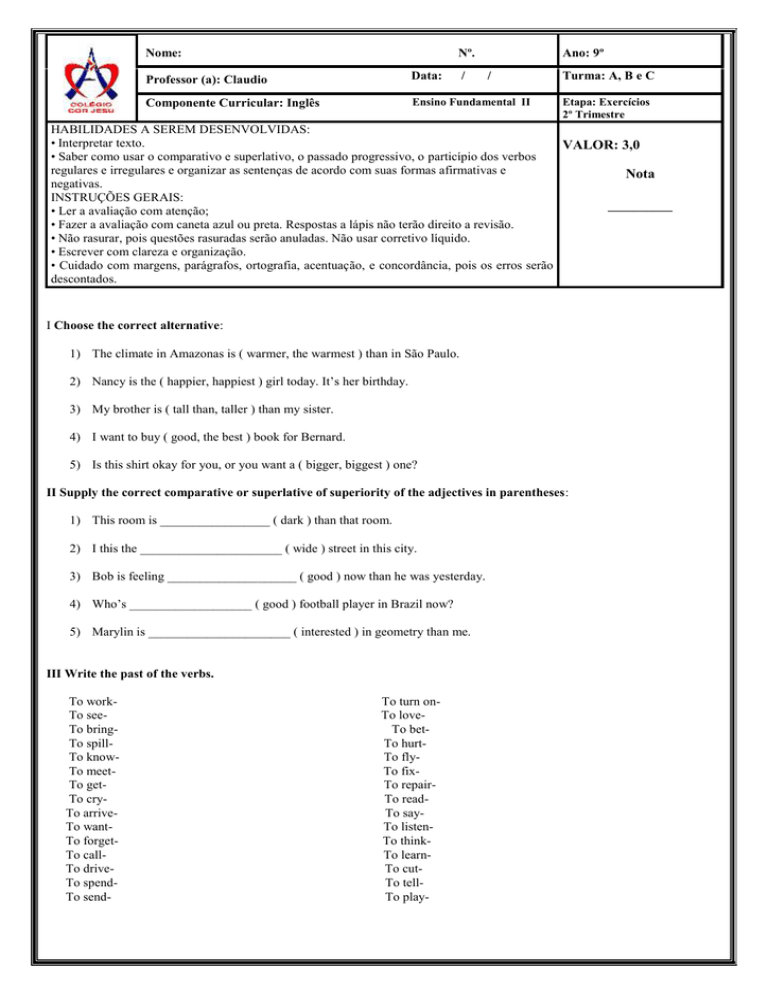
Nome:
Nº.
/
Ano: 9º
Professor (a): Claudio
Data:
/
Componente Curricular: Inglês
Ensino Fundamental II
Turma: A, B e C
Etapa: Exercícios
2º Trimestre
HABILIDADES A SEREM DESENVOLVIDAS:
• Interpretar texto.
VALOR: 3,0
• Saber como usar o comparativo e superlativo, o passado progressivo, o particípio dos verbos
regulares e irregulares e organizar as sentenças de acordo com suas formas afirmativas e
Nota
negativas.
INSTRUÇÕES GERAIS:
__________
• Ler a avaliação com atenção;
• Fazer a avaliação com caneta azul ou preta. Respostas a lápis não terão direito a revisão.
• Não rasurar, pois questões rasuradas serão anuladas. Não usar corretivo líquido.
• Escrever com clareza e organização.
• Cuidado com margens, parágrafos, ortografia, acentuação, e concordância, pois os erros serão
descontados.
I Choose the correct alternative:
1) The climate in Amazonas is ( warmer, the warmest ) than in São Paulo.
2) Nancy is the ( happier, happiest ) girl today. It’s her birthday.
3) My brother is ( tall than, taller ) than my sister.
4) I want to buy ( good, the best ) book for Bernard.
5) Is this shirt okay for you, or you want a ( bigger, biggest ) one?
II Supply the correct comparative or superlative of superiority of the adjectives in parentheses:
1) This room is _________________ ( dark ) than that room.
2) I this the ______________________ ( wide ) street in this city.
3) Bob is feeling ____________________ ( good ) now than he was yesterday.
4) Who’s ___________________ ( good ) football player in Brazil now?
5) Marylin is ______________________ ( interested ) in geometry than me.
III Write the past of the verbs.
To workTo seeTo bringTo spillTo knowTo meetTo getTo cryTo arriveTo wantTo forgetTo callTo driveTo spendTo send-
To turn onTo loveTo betTo hurtTo flyTo fixTo repairTo readTo sayTo listenTo thinkTo learnTo cutTo tellTo play-
To likeTo watchTo writeTo sellTo takeTo come-
To teachTo catchTo JumpTo throwTo dieTo goPresent Perfect Tense -I
Como se forma: presente do verbo to have + particípio passado do verbo principal.
I have studied
You have studied
He has studied
She has studied
We have studied
You have studied
They have studied
Affirmative: They have studied.
Negative : They have not studied.
Formas abreviadas: haven’t (have not), hasn’t (has not).
O particípio passado dos verbos regulares é igual ao passado simples.
Ex: studied, played.
O particípio passado dos verbos irregulares não segue regras.
Elementary
IV Turn into the negative form.
1) I have worked hard.
_________________________________________________
2) You have talked a lot.
_________________________________________________
3) She has washed the dishes.
_________________________________________________
4) He has emptied the trash.
_________________________________________________
5) We have cleaned the room.
_________________________________________________
V Turn into interrogative form.
1) They have built many buildings.
__________________________________________________
2 )I have told him the truth.
__________________________________________________
3) She has bought new dresses.
__________________________________________________
4) We have bought new dresses.
__________________________________________________
5) He has made many mistakes.
__________________________________________________
VI Intermediate
Supply the present Perfect Tense of the verbs in parentheses.
1) That man _________________ (build) another house.
2) We ___________________ (go) to the country by car.
3) She _________________ (cook) our lunch.
4) I __________________ (spend) much money.
5) __________ you __________ (lose) your bag?
6) What _________she _________ (tell) you?
7) They _____________ (write) me a letter.
8) We _________________ (send) you a card.
9) They _____________ (play) soccer.
10) Susan _____________________(be) sick.
Present Perfect Tense – II
O presente perfeito é usado para expressar:
Ações que começam no passado e continuam até o presente.
Ex: I have lived here since 1990.
Ações que aconteceram num tempo indefinido no passado. (Se for mencionado ou sugerido o tempo exato em que a ação
Ocorreu, usa-se o passado simples.)
Ex: I have studied English. (tempo indefinido)
I studied English yesterday. (tempo exato)
Ações que aconteceram várias vezes no passado.
Ex: We have seen that film many times.
Intermediate
VII Supply the Simple Past or the Present Perfect Tense.
1) I ________________ ( finish ) my homework.
2) When I was a boy, I _____________ ( swim ) in the river.
3) John ______________ (lose ) his car keys.
4) She _______________ (meet) all her friends last weekend.
5) He _______________ ( buy ) that old car two years ago.
VIII Advanced
Supply the correct answer. Use the following verb forms.
has slept
has eaten
arrived
have heard
spoke
drove
won
have drunk
have seen
has sung
1) I _____________ many prizes when I was young.
2) He ________________ home yesterday.
3) The phone was ringing when I _________________.
4) She ___________________ in the garden many times.
5) Who _______________ my sandwich?
6) He __________________ that song before.
7) We ________________ to the director last night.
8) You _________________ much beer.
9) Where _________________ you_________________ her?
10) I ________________ that story many times.
Present Perfect tense –III
O presente perfeito é também usado com as seguintes palavras:
Since ( desde ): I have studied English since April.
For (durante ): I have studied English for two years.
Just (acabar de ): They have Just arrived from London.
Already ( já ): They have already arrived.
Have they already arrived?
Yet ( já, ainda ): They haven’t arrived yet.
Have they arrived yet?
IX -Elementary
Supply since or for.
1) We have lived there _______________ two years.
2) We have lived there _______________ last year.
3) The bell has rung ____________________ half an hour.
4) Nobody has written to me _______________ many weeks.
5) It has rained ________________ three o’clock.
X- Supply yet or already.
1) I’ve ___________ done my exercises.
2) She hasn’t answered the question_______________.
3) They’ve ________________talked to me.
4) Have you ______________invited her?
5) Has she left___________?
XI Supply the Present Perfect Tense of the verbs in parentheses.
1) Karl _________ just __________ ( arrive ).
2) I _______________ ( wait ) for you for two hours.
3) He __________________ ( attract ) me since I was a girl.
4) ______________ they already ________________ ( buy ) their house?
5) ___________ you ______________ ( paint ) your house yet?
XII Supply the Past Continuous Tense of the verbs in parentheses.
1) The children __________________ ( cry ) 5 minutes ago.
2) The boys _________________ ( do ) their Japanese lesson.
3) Roy _____________________ ( wear ) his brown shirt.
4) We _______________________ ( read ) the newspaper one hour ago.
5) Jane ____________________ ( prepare ) dinner.
A GOOD NAME IS MORE DESIRABLE THAN GREAT RICHES; TO BE ESTEEMED IS BETTER THAN SILVER OR
GOLD.(PROVERBS) 22,1.
A BOA REPUTAÇÃO VALE MAIS QUE GRANDES RIQUEZAS; DESFRUTAR DE BOA ESTIMA VALE MAIS QUE PRATA E
OURO.

